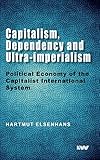Capitalism, Dependency and Ultra-imperialism : Political Economy of the Capitalist International System Hartmut Elsenhans
Material type: TextLanguage: Eng. Publication details: New Delhi Knowledge Word Pvt. Ltd. 2023Description: 234p. 15.24 x 1.75 x 22.86 cmISBN:
TextLanguage: Eng. Publication details: New Delhi Knowledge Word Pvt. Ltd. 2023Description: 234p. 15.24 x 1.75 x 22.86 cmISBN: - 9789394915015
- 325.341 ELS
| Item type | Current library | Call number | Materials specified | Status | Date due | Barcode | |
|---|---|---|---|---|---|---|---|
 Books
Books
|
Rashtriya Raksha University | 325.341 ELS (Browse shelf(Opens below)) | Available | 13058 | |||
 Books
Books
|
Rashtriya Raksha University | 325.341 ELS (Browse shelf(Opens below)) | Available | 13059 |
Browsing Rashtriya Raksha University shelves Close shelf browser (Hides shelf browser)
This book assembles main contributions to an alternative explanation of globalisation and the political economic structures of the international system. As the result of capitalism, globalisation does not transfer basic capitalist structures from the Centre to the Periphery. Capitalism is based on rising mass incomes that create investment opportunities and, thus, the possibility of profit. A structurally homogeneous and ultraimperialist Centre dominates a deeply fissured Periphery of structurally heterogeneous societies and economies. Capitalism penetrates underdeveloped regions and deforms them through rent, which obstructs expanding internal mass markets while labour goes unempowered. Rent constitutes the basis for state operations and the role of emerging state classes. While globalisation disempowers labour in both the West and in the South, it has given new comparative advantage to the South. The shift from rent appropriation in the South via raw material exports to export-led manufacturing is based on devaluation below purchasing power parity and, hence, on a rent from agriculture that is based on the Green Revolution. Its impact is, however, not always sufficient to compensate for the loss of influence experienced by social reformist forces. A novel multipolar system based on the balance power has emerged. Multiethnic empires are held together with large varieties of however always identitarian ideologies. This global system is composed of powers that are internally and externally opposed to peaceful change. Across the globe, there is an impending danger of globalisation of rent.
There are no comments on this title.





